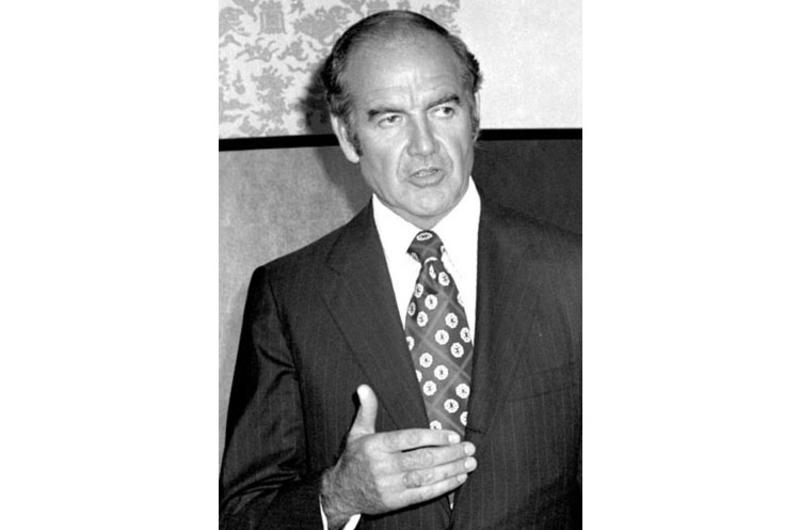McGovern blasts Muskie over statement on black running mate

Sen. George McGovern speaks to reporters at Tokyo's Imperial Hotel in September, 1971.
By JIM LEA | Stars and Stripes September 20, 1971
TOKYO — Sen. George McGovern, D-S.D., said Saturday he was "startled and surprised" by statements by Sen. Edmund Muskie that he would not have a black man for a running mate in next year's presidential election.
"I frankly think it's an incredible position for anyone aspiring to the presidency to take," McGovern told a luncheon meeting of the Japan Press Club at the Imperial Hotel. "The Constitution of the United States has no restriction on grounds of color for the highest office in the land. We began by the assertion that all men are created equal.
"I would say that no one aspiring to the presidency should bar as a running mate anyone on the grounds of either color or sex. Frankly, I'm startled and surprised by Sen. Muskie's position."
McGovern, who arrived Friday from Vietnam, also reiterated statements he made last week in Paris after meeting with North Vietnamese and Viet Cong delegates to the Paris peace talks.
He had been quoted then as saying that the Communists had assured him that they would negotiate the release of U.S. prisoners of war separately from the other six points of their seven-point peace proposal if the United States would set a definite timetable for the withdrawal of its troops from South Vietnam.
The North Vietnamese issued a statement later, however, saying that the seven points of the proposal were inseparable.
He said the confusion was caused by "a semantics problem."
"There is no question at all that the North Vietnamese delegation told me that it is possible to reach agreement on point one (U.S. withdrawal and the release of U.S. prisoners) separable from the other points," he said.
He said he read a New York Times article detailing Hanoi's stand on its peace proposal which he quoted as saying "to show our good faith we would be willing to enter into discussions under point one without reference to the other points."
"I read this to negotiator Xuan Thuy and asked if that was their position and he said, `That is our position.' I was told the same thing by representatives of 'the Provincial Revolutionary Government."
McGovern said he was convinced that the North Vietnamese and Viet Cong would not accept the "continued presence of (President) Thieu in South Vietnam.
"They will never negotiate with him. My own interpretation of their willingness to proceed with discussions under point 1 is that they are convinced that if the United States will set a date for the withdrawal of forces and begin that withdrawal on schedule that this will lead to the replacement of Thieu by indigenous political forces in South Vietnam.
"They are not asking the United States to do anything affirmative to replace Thieu. The implication is that if we get out of the way, Thieu will collapse.
"There is no question at all that they attach number-one importance to the first point and if we begin discussing that point I have no doubt that we can break the deadlock in Paris and progress on the other points will come automatically."
McGovern said that the present United States position on the admission of China to the United Nations will "delay rather than stimulate mature relations between the United States and the people of China.
"The Peoples Republic of China should be asked to assume its proper role in the United Nations, on the Security Council, in the General Assembly and in all other United Nations agencies as the sole legitimate government of China. The United States should seek formal diplomatic relations with Peking on the same basis.
"The future legal status of Taiwan," he said, "is a matter which can only be left to peaceful resolution on the part of people on both sides of the Taiwan Strait.



